
Eosinophilic esophagitis (EoE) causes inflammation and swelling in your esophagus. It shouldn't change the length of your life, but it could affect your quality of life. Over time, EoE can leave permanent damage and scars in your esophagus that make it hard to eat. The stress of living with a chronic disease can be hard on your emotional health, too.
There’s no cure for EoE, but proper treatment, which usually includes medicine and changes to your diet, can keep it under control. Because EoE is a lifelong condition, it's important to stick to your treatment plan. When you do, you can avoid potential physical and emotional complications.
EoE Complications
In EoE, immune cells called eosinophils build up in the lining of your esophagus. If you don't treat it, these immune cells continue to build up and cause inflammation. In the short term, inflammation makes it harder to swallow. Food can't move as easily down your esophagus to your stomach. You may feel sick to your stomach or throw up after you eat.
Over time, ongoing inflammation can cause scars to form in your esophagus. This thick, tough tissue narrows the passage that food and drinks travel from your mouth to your stomach and makes it difficult for them to get through. When this happens, it might feel like food is stuck in your throat and make it uncomfortable to eat. If you can't eat much, you won't get the nutrients you need to stay healthy.
Severe swelling can narrow your esophagus so much that food gets stuck inside. This is called an impaction. It's an emergency that needs medical attention right away.
A lot of swelling in your esophagus or throwing up from EoE can damage the esophagus so much that holes form in the lining. The name for this is perforation. Holes in the esophagus are also a complication of endoscopy, a test that helps your doctor diagnose EoE and monitor the disease.
Life With EoE
When it gets hard to swallow, some people adapt by changing the way they eat. You might notice that you:
- Eat more slowly than usual
- Chew your food for a long time
- Take a drink with each bite
- Avoid hard or chewy foods like meat
These tactics mask symptoms, but they won't make EoE go away or prevent its complications. A better strategy is to follow your care team’s treatment advice.
Your allergist and dietitian can help you manage food allergies, asthma, and other conditions that sometimes trigger or happen with EoE. Your GI doctor will have treatments to bring down inflammation and reduce EoE symptoms.
How to Prevent and Manage EoE Complications
To keep your symptoms under control, avoid your trigger foods, start on treatment early, and stay on it.
There are three main parts to EoE treatment, which some experts call the "three Ds:"
- Diet changes
- Drugs
- Dilation
Diet changes. Allergy tests and an elimination diet can show which foods trigger your symptoms. Eggs, soy, dairy, and wheat are the most common food triggers of EoE. Once you identify your food allergies, a dietitian can help you cut those foods out of your diet.
Drugs. Dupilumab (Dupixent) is the only medicine approved to treat EoE. It reduces swelling in your esophagus so you can swallow more easily. Steroids and proton pump inhibitors (PPIs) are other treatments that bring down inflammation and help manage symptoms.
Dilation. Esophageal dilation is a treatment for narrowing of the esophagus (esophageal stricture). In this procedure, a doctor uses a balloon or plastic tool to stretch and widen your esophagus. After dilation, it’ll be easier for you to eat. The improvement should last a long time.
Your treatment may call for a whole team of specialists to support you. Members might include a(n):
- Allergy specialist
- GI doctor, or gastroenterologist
- Dietitian
- Psychologist, therapist, or other mental health provider
- Social worker
Follow their advice and reach out to them when you need more help.
Once you start on a treatment plan, see your doctor for regular checkups. They can spot signs that your disease is getting worse and suggest treatment changes.
Caring for Your Mental Health
EoE doesn't just cause physical symptoms like trouble swallowing and nausea. Like any lifelong condition, it can also affect your mental well-being.
Anxiety and depression are more common in people with EoE than in people who don’t have it. It's normal to be sad or worried when you live with an ongoing and sometimes painful disease.
You might worry about having to eat a special diet or take medicine that could cause side effects. The embarrassment of struggling to eat or possibly choking in public could stop you from going out with friends or eating at restaurants.
If you feel low, ask for help. Talk to close family or friends. Or get advice from a psychologist, therapist, or other mental health care provider.
Another place to get help is an EoE support group. You can find one through your doctor or the nonprofit organization American Partnership for Eosinophilic Disorders (APFED). You might also find support groups online.
EoE is a complex, long-term disease. That's why it's important to assemble a team of specialists and work with them to manage your condition. Stick with your treatment plan and be proactive about asking for help when you need it.
Show Sources
Photo Credit: Scott Bodell / Medical Images
SOURCES:
Allergo Journal International: "Current concepts in eosinophilic esophagitis."
American Academy of Allergy, Asthma & Immunology: "Eosinophilic Esophagitis."
American Partnership for Eosinophilic Disorders: "Support Groups."
American Society for Gastrointestinal Endoscopy: "Understanding Esophageal Dilation."
Digestion: "An Update on Eosinophilic Esophagitis: Etiological Factors, Coexisting Diseases, and Complications."
Journal of Allergy and Clinical Immunology: "Diagnosis and Treatment of Eosinophilic Esophagitis."
Journal of Asthma and Allergy: "Anxiety and Depression in Eosinophilic Esophagitis: A Scoping Review and Recommendations for Future Research."
Mayo Clinic: "Eosinophilic esophagitis."
Nationwide Children's: "Eosinophilic Esophagitis (EoE) Clinic."